Team management is a muscle. The more you work at it, the stronger you become at managing a team.
When considering how to manage a team, success in this field comes with a lot of practice, learning the right skills and techniques, and looking to peers for deeper guidance. It also involves using the right platforms to make managing your team a smoother operation. Platforms like monday work management take care of a lot of the work management so you can focus on managing people.
This post will examine the ins and outs of team management: what it is, the skills you need, its benefits, tips for success, and more. We’ll also look more closely at how a Work OS like monday work management is critical for effective team management.
Get startedWhat is team management?
Team management is a manager’s ability to carry out and coordinate an entire team to execute their tasks and common goals. Team managers need to support their team through communication, active listening, motivation, and fostering a positive work environment to help each individual team member complete their tasks. Often, project management software is involved to help managers manage teams in an efficient and organized way.
Efficient team management skills are crucial because they help employees feel motivated, making them more productive.
To effectively learn how to manage a team, we first need to understand what makes a team manager successful. We break down some of the necessities below.
Team manager vs team leader: What’s the difference?
It’s easy to get confused between the roles of team manager and team leader. While in some work settings, these roles may fall on the same person, there are differences between the two.
A great team manager is someone who manages day-to-day tasks within their team and ensures team members understand and correctly execute workflows. It’s their job to make sure the team’s goal is accomplished by keeping everyone organized and on the same page.
Team leaders, on the other hand, are responsible for ensuring their team is aligned with the company vision and inspires members to work towards it. Rather than focus on the day-to-day tasks, team leaders are more concerned with the big picture.
Types of team management
There are different styles managers can adopt when it comes to directing their team. The management style you go with can ultimately dictate your approach to managing your team, from the activities you choose to foster teamwork to how you deliver feedback and evaluations. Here are a few common team management styles we see in the workplace:
- Autocratic management: Team managers make decisions unilaterally, without much input from team members
- Democratic management: Team members share their opinions and insights and participate in decision-making that will affect the team, creating a sense of shared responsibility
- Laissez-faire management: Taking a hands-off approach, the manager will allow team members to work independently with little interjection to encourage a culture of autonomy
- Transformational management: Team managers inspire and motivate members to reach for extraordinary results through change and innovation
- Transactional management: Based on a system of rewards and penalties, managers focus on tasks and clear instructions to incentivize workers
- Servant leadership: Managers are focused on the growth of individual team members and strive to help them grow as much as possible
- Collaborative management: Teams are focused on working together and making decisions collectively while the manager facilitates cooperation in the group
- Coaching management: The manager acts as a coach and provides guidance, support, and feedback to help hone team members’ skills
Skills for effective team management
As a manager, the skills you exhibit will influence how your team performs. Team managers need to manage the demands of the company, in other words, fulfilling goals and deliverables, while still being supportive of their team member’s individual needs.
Honing the right skills as a team manager is essential to strike this delicate balance. Some key skills for effective team management include:
- Strong communication and active listening skills
- A mindset of growth for both the company and team members
- Goal setting and performance management
- Time management
- Delegating tasks to the right employees
- Decision-making and problem-solving
- Leadership that inspires and guides members
- Empathy and understanding
- Conflict resolution
- Adaptability
How to develop your team management skills
With a long list of skills for effective team management, it can be tricky to master it all while juggling so many responsibilities. Developing these skills comes with time and practice. It’s important to take time to self-reflect on your own skills and how you handle specific situations in your team, while also seeking guidance from other team managers and leaders around you.
Additionally, it’s possible to hone your soft skills with ongoing leadership training and courses that are focused on skills like communication and decision-making. Furthermore, take the time to actively seek feedback from colleagues and mentors to identify areas you can improve and observe them in their managerial style to see what you can incorporate into your own approach.
The benefits of effective team management
Aside from creating a positive work environment and making sure all team members are aligned with the team and organization’s goals, there are other benefits to learning how to manage a team effectively. Below, we break down three reasons why team management is important.
1. Team management can lead to happier employees
It’s part of a team leader or manager’s role to ensure employees feel good about where they work, as it can have a positive impact on the business’s success. Studies show that when employees feel happy, companies outperform their competition by 20%. There’s also often a higher quality of customer service, and as a result, customers become more loyal.
To increase employee happiness, managers can:
- Encourage employee feedback and follow through with acting on it
- Prioritize work-life balance by encouraging employees to leave the office on time or follow a more flexible work schedule
- Be transparent by openly communicating about mistakes, shortcomings, results, management plans, and more with employees
2. More productive employees
With effective team management, you can shape a culture where employees thrive. Fostering a positive team culture goes a long way in engaging employees, and studies show that employees who are highly engaged are 18% more productive than those who are less engaged.
Here are a few ways managers can shape company culture:
- Demonstrate leadership through participation by attending company events, showing excitement for team progress, and connecting with employees on a personal level
- Recognize employees for completing tasks instead of solely waiting for the results
- Discuss and define goals together so employees know what’s important to a company and what’s not before determining what’s worth focusing on
3. Reduce employee turnover
Studies show that the cost of replacing a single employee can range from half to double their annual salary. Turnover is a costly problem, so it’s in a company’s best interest to keep the rate of turnover low, which is where effective team management comes in.
When focusing on hiring the right people, here are a few things managers can do:
- Determine if they would fit your company culture by asking questions related to the candidate’s values or interpersonal skills and assess whether they’d fit in with your team
- Hire slowly, rushing to fill a vacant position may increase the chances of winding up with someone who isn’t a good fit
- Have candidates meet or interview with team members to understand whether they will mesh with the rest of your team
Team management career paths
Even if you don’t want to know how to manage a team specifically, team management skills open the door to a number of exciting career paths in different domains. Here are different careers you can pursue with technical skills and experience in team management:
- Project Manager: Coordinates tasks, resources, and project timelines
- Operations Manager: Manages daily operations in a company to ensure efficiency
- Team Leader: Lead, guide, and support teams in a department
- Product Manager: Manage the lifecycle and development of a product by coordinating different teams
- Human Resources Manager: Manage employee relations, recruitment, and professional development
- Customer Service Manager: Oversee customer service teams and enhance customer satisfaction by resolving issues
6 essential tips for effective team management
As we’ve outlined above, a good manager is an important part of a team’s success. They regularly keep the team motivated, on track, informed of company milestones and goals, and ensure everyone is satisfied and contributing towards the company’s bottom line.
Here are a few tips for how to manage a team:
1. Communicate directly and transparently
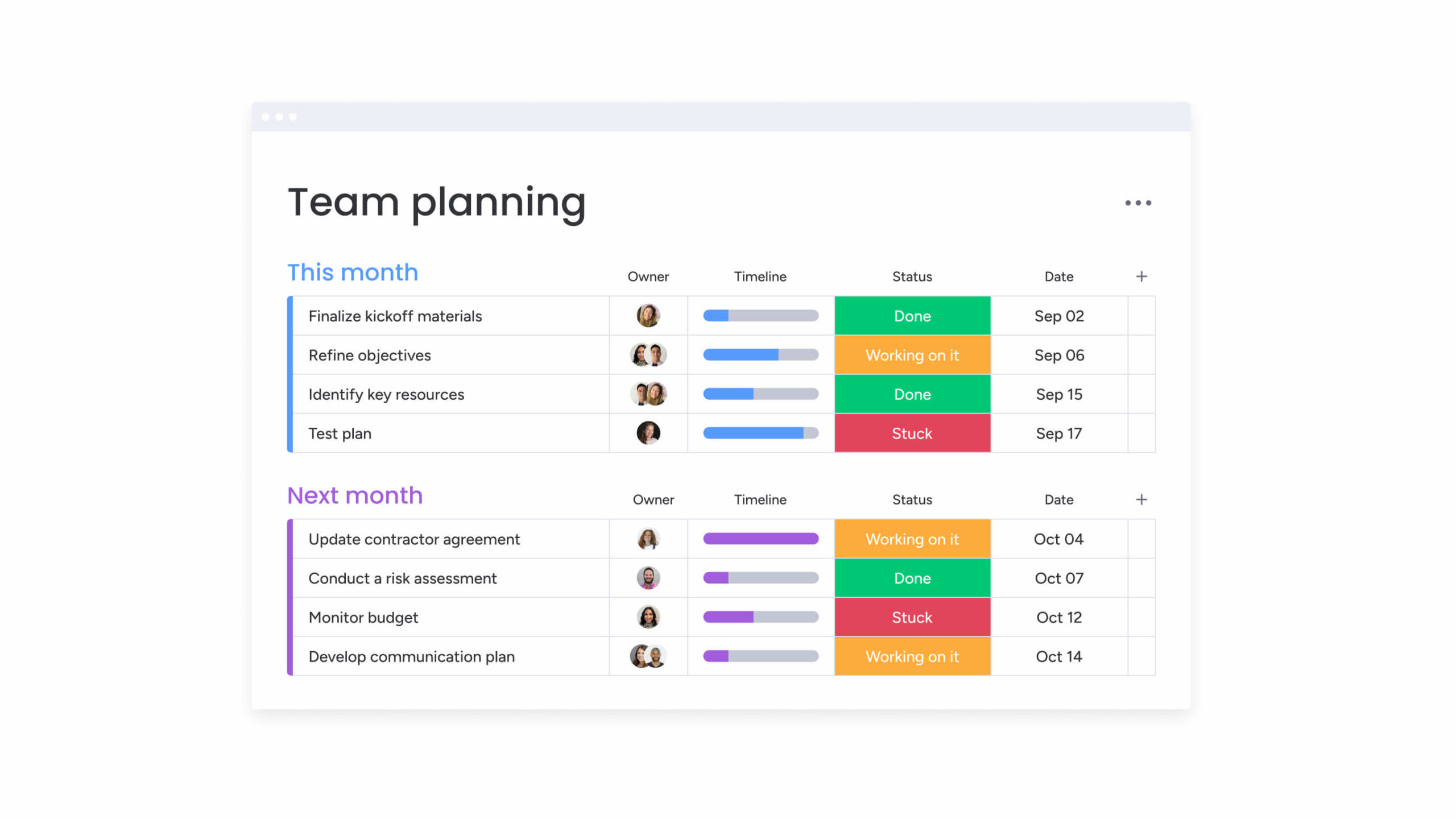
Employees dread miscommunication because it causes confusion and stress. Effective communication skills ensure team-wide clarity on tasks, deadlines, and goals. An example would include using collaboration features in a social media post scheduler that ensure clear communication during a social media content strategy. This transparency allows a team to focus on their productivity and collaboration.
A workplace platform, like monday work management, can help managers and team members communicate better through regular updates. Managers can use a project communication plan for team meetings, tasks, and progress reviews and assign team members to action items while monitoring progress at every stage.
2. Offer a clear vision
For managers, keeping their team on track to achieve goals is an important part of their role. Managers who don’t have their eyes on the ball can’t ensure their employees move in the right direction.
A good way to maintain momentum and keep track of different asks is to set a clear vision that highlights short-term and long-term project goals. Using team management software, such as monday work management’s OKR (objectives and key results) template, to list and track goals can help maintain focus while directing teams toward achieving their goals.
Get started3. Encourage team collaboration
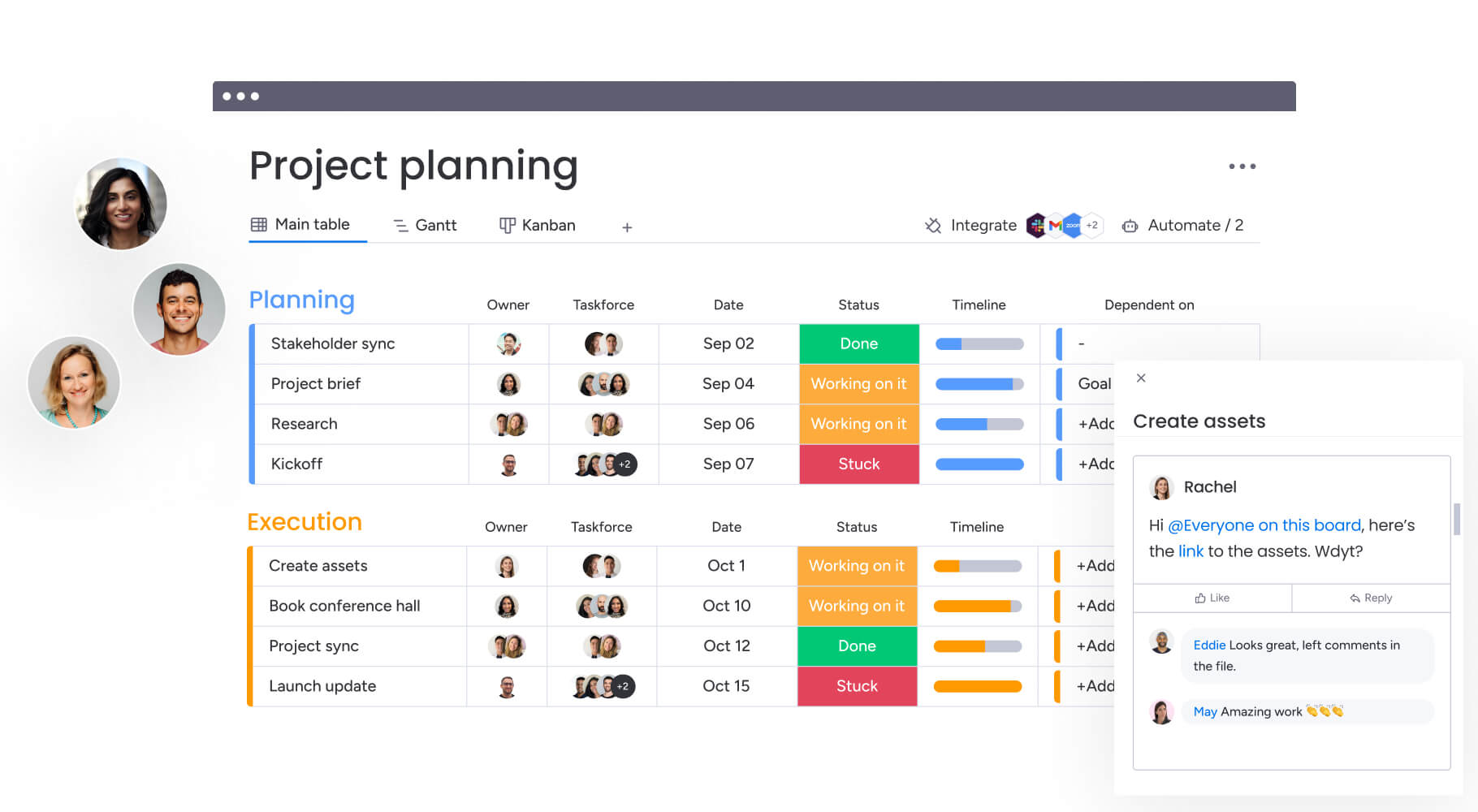
Employees who feel connected to their team and company culture are more likely to be engaged and more productive at work. Effective collaboration is crucial for teams to get things done together, on time, and without conflicts.
To accomplish this, managers can turn to collaboration software. Platforms with a customizable project tracking template can help managers and teams set up projects, track tasks, deadlines, receive and send notifications, and make changes quickly. This transparent approach also enables employees to receive feedback and flag any issues immediately.
4. Delegate with care
A manager is expected to assign tasks to employees based on skill, experience, and competency. They must trust that every team member can complete assigned tasks on time.
Ideally, every team member should have a fair workload, but 21% of employees feel overwhelmed with their workload “most of the time.”
A solution for this concern can be to use workflow automations. With the right Work OS, new tasks coming in can be automatically assigned to team members based on parameters like current workload, region, expertise, and others. Additionally, a team task management template can help managers delegate tasks by easily identifying team members’ capacities and making changes to reduce heavy workloads.
5. Prioritize feedback and recognition
Constructive feedback sessions provide insights into areas for improvement, both for employees and managers. It gives employees clarity on where they stand and where they’re headed. When employees provide feedback, listen to what they’re saying and if possible, act on it. Changes inspired by these sessions can help employees, managers, and the team perform better and build trust.
Another critical aspect of feedback sessions is recognition. Appreciation of team members’ efforts and achievements has a significant impact on employee morale, while a lack of recognition can lead to burnout. Scheduling feedback sessions while handling many other responsibilities can be challenging. One tool managers can utilize for easy feedback scheduling and managing is a feedback tracker where all input is organized in a unified board.
6. Overcome remote work challenges
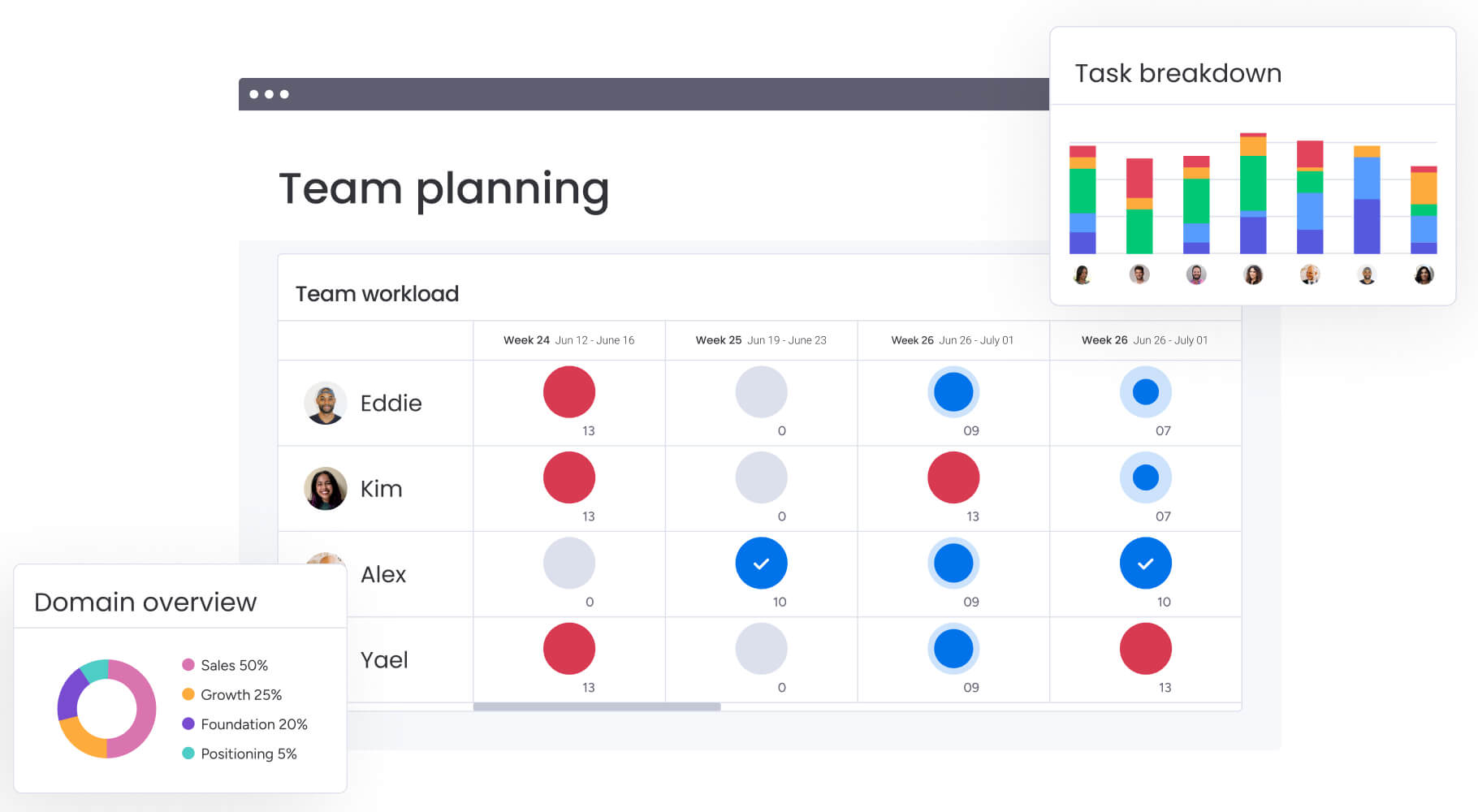
To handle a remote team, managers must identify and solve the challenges of hiring and managing virtual team members. Some common challenges include scheduling and miscommunication. To overcome these roadblocks, managers can record all information from new hires to team activities on a remote work plan template.
Managers can even use this template as a way to organize remote employees’ feedback. Regular and ongoing feedback can do a lot to engage an employee, especially when they’re remote and connecting is more challenging. Research shows that employees who receive feedback daily as opposed to annually feel 3.6 times more motivated. A good way to tackle this is with the FAST feedback approach.
Effective team management, meet monday work management
Learning the right skills and putting them into practice is a huge part of being a successful team manager, but it’s not the only thing that will lead to effective team management. Finding the right platform to help you manage your work so you can focus on more personally managing your team is critical.
Platforms like monday work management make managing tasks and projects intuitive so you can spend more time managing your team’s needs. With monday work management, managers can make sure projects are on track and tasks are assigned correctly. The platform also helps team members work more independently with strong communication and collaboration features. Let’s take a closer look at a few of the monday work management features that make team management easier.
Implement no-code automations
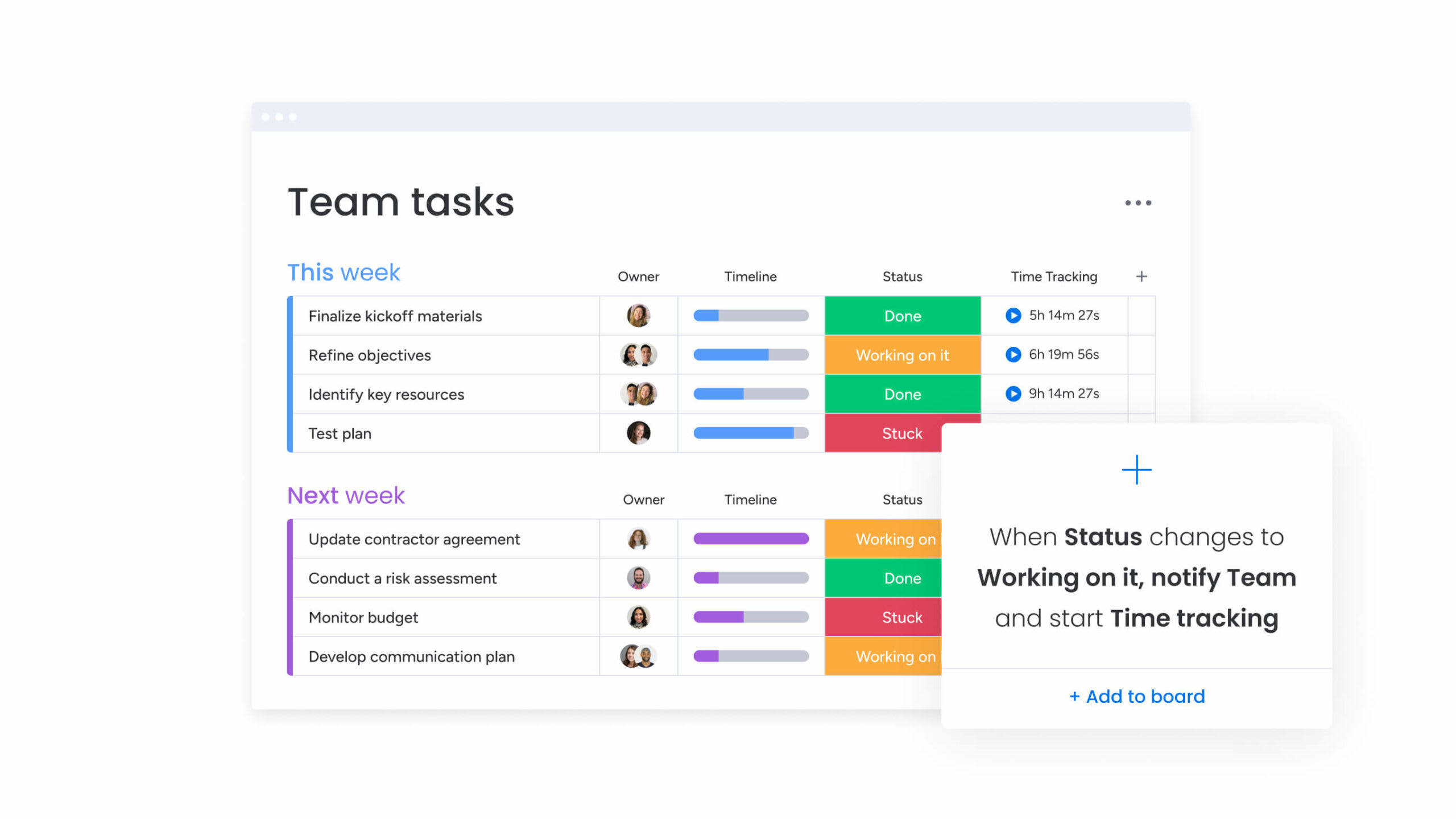
monday work management makes setting automations quick and painless so you can save time on manual and repetitive tasks. Things like notifications, assigning tasks, messaging, and filtering can be done in an instant with automations, allowing you to spend more time on higher-value tasks.
Track goals, strategies, and results
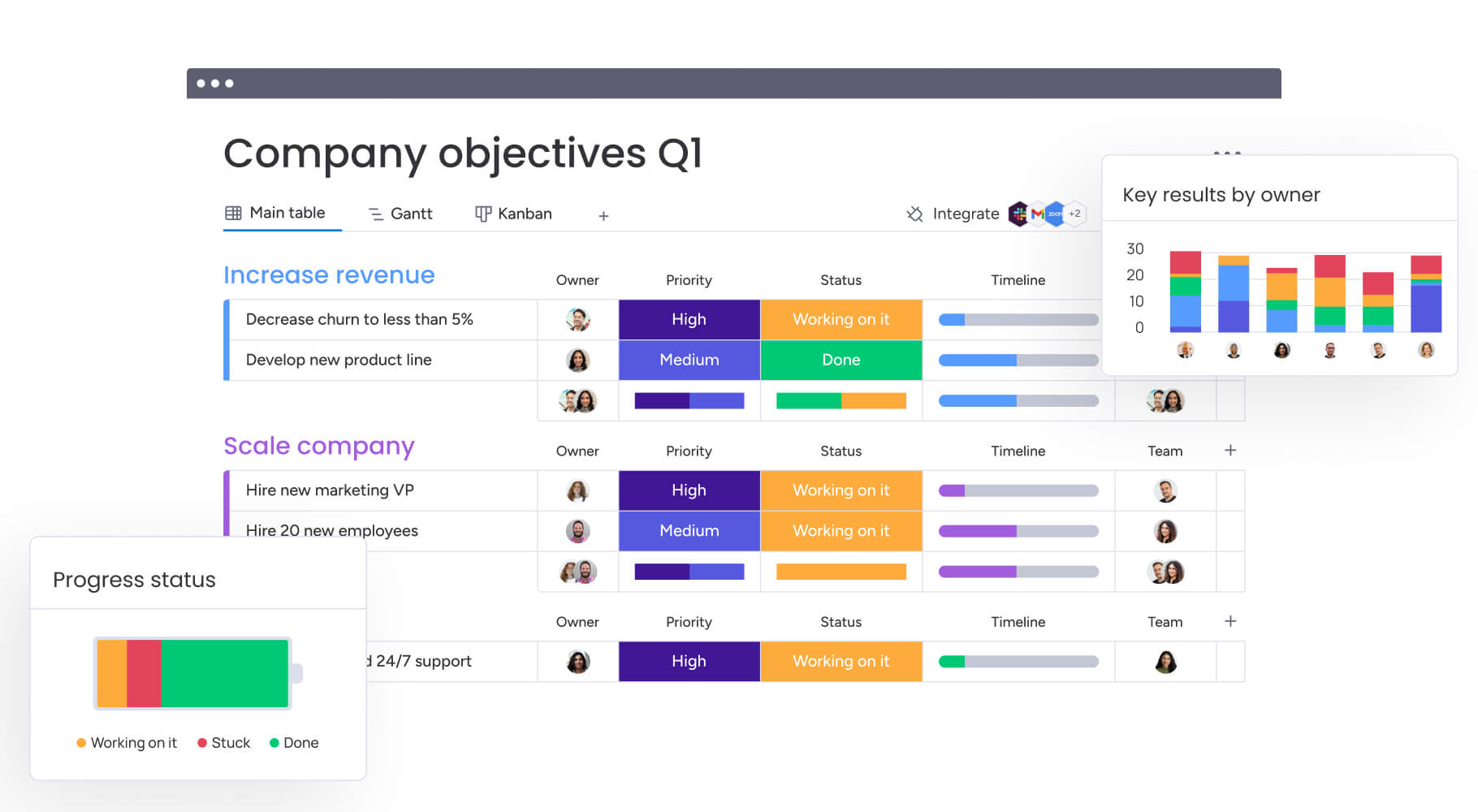
Easily track different metrics and strategies with different boards and templates. Create a tailored and detailed action plan based on your company goals and key strategies and put them in motion with customizable boards where you can see results in real time.
Manage resources with real-time dashboards
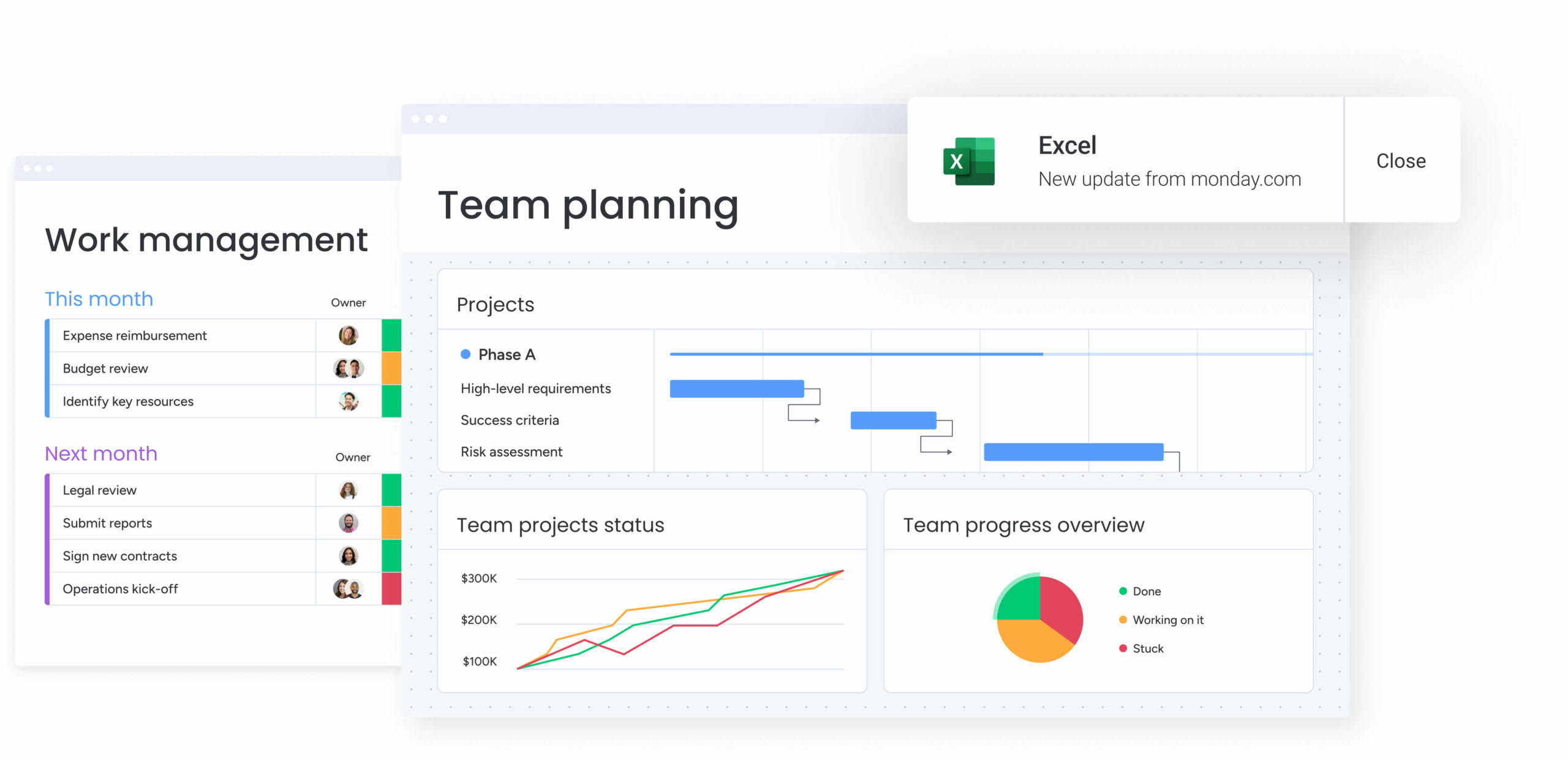
Get a bird’s eye view of all your resources in one place. The Workload View helps you see which team members have a lot on their plates plus there are dashboards to track team performance, sales, and more so you can see everything at a glance.
Get startedStrong team management helps the whole company run smoothly
Effective team management is essential for both team and organizational success. A manager who excels in fundamental areas, such as setting goals, delegating tasks, and providing consistent feedback is more likely to have engaged employees, working towards the company’s goals. Think of platforms like monday work management as a sidekick helping you manage work so you can focus on steering team members in the right direction to reach your goals.
FAQs
How do you effectively manage a small team?
To manage a small team, it’s important to build strong relationships with each member, set clear goals, and delegate tasks thoughtfully. It’s also essential to maintain open communication to ensure all team members are aligned.
What are the 3 C's of a team?
The three C’s of a team are Communication, Collaboration, and Coordination. These three things are essential for a team to function successfully and meet objectives.
How do you manage an ineffective team?
Managing an ineffective team starts with identifying the root cause of ineffectiveness. Next, you should address skill gaps or conflicts in your team, provide direction, and foster a positive and collaborative team environment.
 Get started
Get started 

